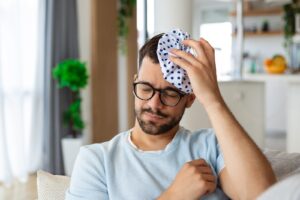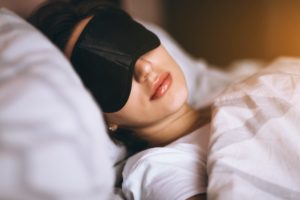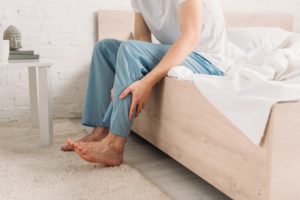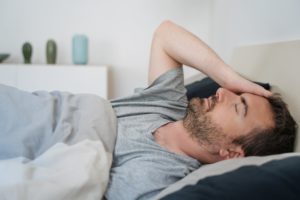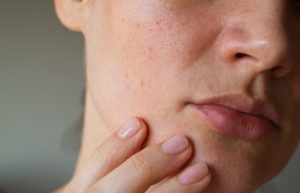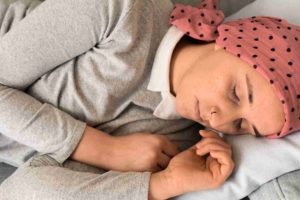Fibromyalgia and Sleep
Fibromyalgia, also known as fibromyalgia syndrome, is a chronic disorder characterized by widespread feelings of pain and stiffness in the muscles and joints. Roughly 4 million people in the U.S. live with fibromyalgia. Although the cause of this condition is not known, patients can treat and manage their symptoms through medication, therapy, and lifestyle changes.
Sleep problems are a common symptom of fibromyalgia. For some people with the disorder, sleep disturbances exacerbate their symptoms and lead them into a vicious cycle of pain and poor sleep. Practicing good sleep hygiene and adopting healthy sleep habits can alleviate fibromyalgia-related sleep issues.
How Does Fibromyalgia Affect Sleep?
It is widely believed that people with fibromyalgia have a lower pressure-pain threshold than those who don’t live with this condition, making them more sensitive to pain. This is known as “abnormal pain perception processing.” Neuroimaging studies appear to back up this claim, as these tests reveal similar neural activation between people with fibromyalgia and healthy, non-affected adults.
Non-restorative sleep and daytime fatigue are two common symptoms of fibromyalgia. Some polysomnographic data suggests people with the condition experience wakefulness during the non-rapid eye movement (NREM) stages of the sleep cycle and receive less slow-wave sleep as a result.
Sleep and fibromyalgia share a bidirectional relationship. Just as painful symptoms can prevent patients from getting enough rest, sleep deprivation can exacerbate the widespread feelings of pain and tenderness brought on by fibromyalgia. Sleep loss can also lower a person’s pain threshold. As a result, lack of sleep or poor sleep quality may cause fibromyalgia symptoms to occur in otherwise healthy people.
While fibromyalgia can occur at any age, most patients are middle-aged. Additionally, 80-90% of people with fibromyalgia are women. Certain diseases can increase one’s risk of developing fibromyalgia symptoms, such as rheumatoid arthritis, spinal arthritis, and lupus. Fibromyalgia has also been linked to two sleep disorders, insomnia and restless legs syndrome.
Fibromyalgia and Insomnia
Insomnia is a sleep disorder characterized by persistent difficulty falling or staying asleep despite the means and opportunity to get an adequate amount of rest each night. People with insomnia also experience daytime impairments such as fatigue, mood disturbances, and reduced motivation and energy.
Insomnia often occurs in people with fibromyalgia. Insomnia, non-restorative sleep, and fatigue are commonly used as markers for a fibromyalgia diagnosis. Since lack of sleep can decrease your pain threshold, insomnia can also worsen fibromyalgia symptoms.
Insomnia patients may receive cognitive behavioral therapy for insomnia (CBT-I), a structured and evidence-based treatment program that pinpoints thoughts, feelings, and behaviors that may be contributing to their symptoms. One recent study found that CBT-I can slow or reverse atrophy of the gray matter in the central nervous system, a common issue that occurs in people with fibromyalgia.
Another study explored the effect of sleep medication on widespread pain caused by fibromyalgia. Participants with fibromyalgia who were administered suvorexant, a medication approved for the treatment of insomnia, slept longer and experienced less pain the next day compared to participants who took a placebo.
If you live with insomnia and fibromyalgia, we recommend talking to your doctor about CBT-I, medications, and other treatment options that can potentially reduce symptoms of both conditions.
Fibromyalgia and Restless Legs Syndrome
Restless legs syndrome (RLS) – also known as Willis-Ekbom disease – is a sensorimotor disorder characterized by a strong urge to move or adjust the legs that is typically accompanied by uncomfortable sensations.
People with RLS usually experience the most unpleasant sensations when they are lying down or sitting during the evening or nighttime hours. Walking or stretching can temporarily alleviate the discomfort, but symptoms often recur as soon as the person’s body comes to rest again.
Studies show a consistent overlap between fibromyalgia and RLS. Since both conditions are associated with sensory abnormalities, some patients may be misdiagnosed with fibromyalgia after demonstrating RLS symptoms or vice versa. For some people with RLS, treating secondary causes of the disorder can reduce symptoms.

Sleep Tips for People With Fibromyalgia
People with fibromyalgia tend to experience sleep problems whether or not they’ve been diagnosed with a sleep disorder. Managing fibromyalgia symptoms is key, but additional measures these individuals can take to ensure a good night’s rest include:
- Set a Sleep Schedule: A key component of healthy sleep hygiene is going to bed and waking up at the same times each day , even on the weekends. This enables you to get an adequate amount of rest every night, which in turn provides time for your body to physically and mentally repair itself. In order to follow this schedule, you should avoid long naps during the day and consume caffeine in moderation. People with fibromyalgia should also consider quitting smoking, as tobacco is a natural stimulant that can affect your sleep.
- Exercise Regularly: Exercise accomplishes the twofold task of improving sleep and reducing fibromyalgia symptoms. However, sleep deprivation can lower your motivation to exercise on a regular basis. Committing to a workout regimen can help ensure enough rest at night and a decrease in painful symptoms.
- Practice Mindfulness Meditation: Mindfulness meditation emphasizes the importance of being present in the moment, which can help people be more mindful as they go about their day and cope with difficult situations. One study explored the effects of mindfulness meditation techniques on fibromyalgia patients. Researchers found that people with fibromyalgia who practiced this form of meditation reported improvements in overall sleep quality. Other studies posit that mindfulness meditation can also contribute to pain relief, but this claim requires further research.
- Consider Vitamin D Supplements: Some researchers have established a link between vitamin D deficiency and sleep problems , and people with fibromyalgia often exhibit below-average vitamin D levels . Vitamin D supplements on their own can reduce the widespread pain of fibromyalgia. Additionally, one study found that vitamin D supplements taken with Trazadone , an antidepressant medication, were effective at alleviating painful symptoms and improving sleep quality for people with fibromyalgia. Talk to your doctor or healthcare provider about the link between fibromyalgia and vitamin D deficiency to learn about the best options for you.

Still have questions? Ask our community!
Join our Sleep Care Community — a trusted hub of sleep health professionals, product specialists, and people just like you. Whether you need expert sleep advice for your insomnia or you’re searching for the perfect mattress, we’ve got you covered. Get personalized guidance from the experts who know sleep best.
References
13 Sources
-
Choy, E. The role of sleep in pain and fibromyalgia. Nat Rev Rheumatol 11, 513–520 (2015).
http://www.nature.com/articles/nrrheum.2015.56 -
National Center for Complementary and Integrative Health. (2020, November 18). Fibromyalgia: In Depth., Retrieved November 18, 2020, from
https://www.nccih.nih.gov/health/fibromyalgia-in-depth -
McCrae CS, Mundt JM, Curtis AF, Craggs JG, O’Shea AM, Staud R, Berry RB, Perlstein WM, Robinson ME. Gray matter changes following cognitive behavioral therapy for patients with comorbid fibromyalgia and insomnia: a pilot study. J Clin Sleep Med. 2018;14(9):1595–1603.
https://pubmed.ncbi.nlm.nih.gov/30176973/ -
Roehrs T, Withrow D, Koshorek G, Verkler J, Bazan L, Roth T. Sleep and pain in humans with fibromyalgia and comorbid insomnia: double-blind, crossover study of suvorexant 20 mg versus placebo. J Clin Sleep Med. 2020;16(3):415–421.
https://pubmed.ncbi.nlm.nih.gov/31992394/ -
Viola-Saltzman M; Watson NF; Bogart A; Goldberg J; Buchwald D. High prevalence of restless legs syndrome among patients with fibromyalgia: a controlled cross-sectional study. J Clin Sleep Med 2010;6(5):423-427., Retrieved from
https://www.ncbi.nlm.nih.gov/pmc/articles/PMC2952743/ -
Bayard M, Avonda T, Wadzinski J. Restless legs syndrome. Am Fam Physician. 2008 Jul 15;78(2):235-40.
https://pubmed.ncbi.nlm.nih.gov/18697508/ -
Amigues, I. (2019, March). Fibromyalgia. American College of Rheumatology., Retrieved November 18, 2020, from
https://www.rheumatology.org/I-Am-A/Patient-Caregiver/Diseases-Conditions/Fibromyalgia -
Gelles, D. (2020). How to Meditate. The New York Times., Retrieved November 18, 2020, from
https://www.nytimes.com/guides/well/how-to-meditate -
Amutio A, Franco C, Sánchez-Sánchez LC, Pérez-Fuentes MdC, Gázquez-Linares JJ, Van Gordon W and Molero-Jurado MdM (2018) Effects of Mindfulness Training on Sleep Problems in Patients With Fibromyalgia. Front. Psychol. 9:1365. Retrieved from doi:
https://pubmed.ncbi.nlm.nih.gov/30147666/ -
Adler-Neal, A. L., & Zeidan, F. (2017). Mindfulness Meditation for Fibromyalgia: Mechanistic and Clinical Considerations. Current rheumatology reports, 19(9), 59.
https://pubmed.ncbi.nlm.nih.gov/28752493/ -
Doo M. (2018). The Association between Sleep Duration and 25-Hydroxyvitamin D Concentration with Obesity in an Elderly Korean Population: A Cross-Sectional Study. Nutrients, 10(5), 575.
https://pubmed.ncbi.nlm.nih.gov/29738471/ -
Makrani, A. H., Afshari, M., Ghajar, M., Forooghi, Z., & Moosazadeh, M. (2017). Vitamin D and fibromyalgia: a meta-analysis. The Korean journal of pain, 30(4), 250–257.
https://pubmed.ncbi.nlm.nih.gov/29123619/ -
Mirzaei, A., Zabihiyeganeh, M., Jahed, S. A., Khiabani, E., Nojomi, M., & Ghaffari, S. (2018). Effects of vitamin D optimization on quality of life of patients with fibromyalgia: A randomized controlled trial. Medical journal of the Islamic Republic of Iran, 32, 29.
https://pubmed.ncbi.nlm.nih.gov/30159280/


